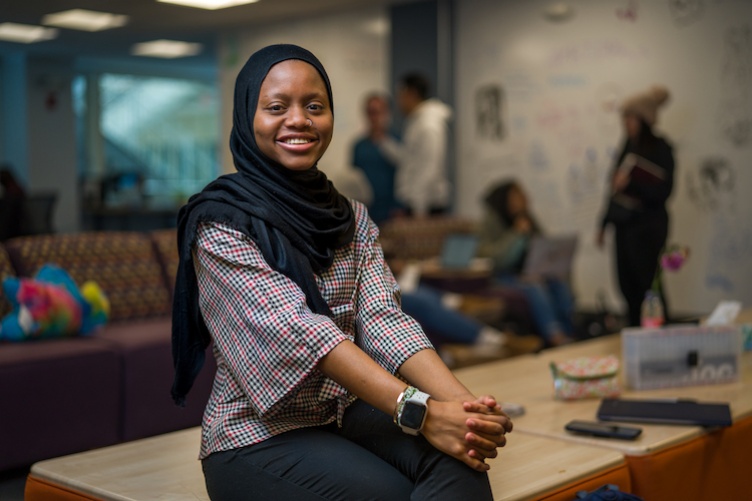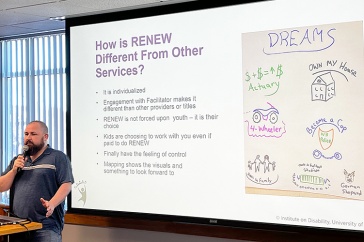
Hamida Hassan ’20 is a Somalian refugee. She was born in a camp in Kenya after civil war forced her family to flee their homeland. That troubled beginning is only a dot on the timeline of Hassan’s life, but it is one that has shaped her past and present and future.
Hassan is a social work major in the accelerated master’s program with a double major in women’s studies and minors in Spanish and social justice leadership. Fluent in the Somali language Maay Maay, she is also teaching herself Hindi and wants to learn Arabic. A McNair Scholar whose research project was on disproportional discipline rates of African American female students compared to Caucasian female students in the public-school system, Hassan is involved with CONNECT, which helps first-generation, low-income and multicultural students transition from high school to college, and the Black Student Union. She also studied abroad in Seville, Spain.
All of this came after — or maybe because — she convinced her parents to let her go to college.
“It was difficult. In the Somalian society, women aren’t encouraged to get an education,” Hassan says. “There are certain standards in the culture, and attending college isn’t one of them. Women usually get married and stay home with the children. It is uncommon even today to find Somalian women who go to college.”
The Hassans came to the U.S. in 2004, living on both the East and West Coast before settling in Manchester, New Hampshire. Hassan is one of 10 children. Her mother is, and always has been, a stay-at-home mom.
Before Hassan decided she wanted to be a social worker, she had thought about becoming a nurse or a doctor, the career choices she says most immigrant parents want their children to follow. She views social work and women’s studies as way to achieve a similar level of success.
"In the Somalian society, women aren’t encouraged to get an education."
“I’m trying to please my parents. I know the kind of struggles they have gone through just for me to be able to go to school, and I want to be able to give back to them,” Hassan says. “But it’s not like I’m trying to live their dreams; this is what I want to do.”
A yearlong internship with Lamprey Health Care in Raymond, New Hampshire, reinforced that belief. Hassan sees herself eventually working with refugees and people of color, perhaps one-on-one or in a community setting. Before then, she would like to be in a hospital environment, which would have her providing a different degree of care. She also recognizes the benefit of having social workers involved in policy making.
“It’s hard to pinpoint my future path,” Hassan says. “There will always be a higher need in social work. I think that’s one of the reasons I’m drawn to it; I see how much there is to do and how many ways there are to help people.”
That vision may be the reason social work professor Vernon Carter, who served as her mentor for her McNair research project, was convinced she would be accepted into UNH’s master's of social work program.
"He has always seen something in me that I haven’t seen in myself. We have similar stories, so we always have something to talk about,” Hassan says. “When I told him I’d gotten into grad school, he said he never doubted that I would.”
Carter is not the only one to believe in Hassan. There have been others right from the start, and then, along the way.
“It took almost a village to convince my parents to let me come here. So many people advocated for me — my brother-in-law (who is working towards a master’s degree), my ELL (English language learners) teacher from middle school, the people at My Turn (a New Hampshire nonprofit that helps disadvantaged youth further their education),” Hassan says. “If it weren’t for all of them, I don’t know that I would be on a college campus today.”
-
Written By:
Jody Record ’95 | Communications and Public Affairs | jody.record@unh.edu
















































